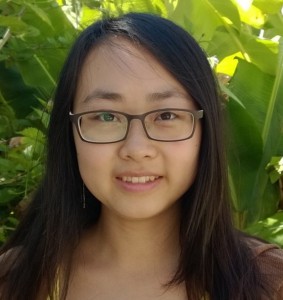Meet Mengdan Yu, Statistics summer scholar
Every year, the Department of Statistics offers summer scholarships to a number of students so they can work with our staff on real-world projects. We’ll be profiling them on Stats Chat.
Mengdan (below) is working with Jessica McLay on a project titled The simario R package. She explains:
“The simario R package is a collection of R functions for performing dynamic microsimulation developed by COMPASS (the Centre of Methods and Policy Application in the Social Sciences at the University of Auckland). Dynamic microsimulation is used to test ‘what if?’ situations. The starting point of the simulation is a set of attributes for each unit (usually individual) and the attributes (variables) are simulated or updated in annual steps. User-specified modifications can be made on the variables at the start or any point during simulation in order to see the effects on output attributes of interest.
“A simple demonstration microsimulation model (demo model) using the simario R functions was created two years ago, but the focus since then has been on developing a complicated microsimulation model called Modelling the Early Life Course (MELC). Compared to the demo model, the MELC model uses newer versions of the simario functions and has had a lot of additional functionality built in.
“What I’m doing for my summer project is ensuring that the newer versions of the simario functions work properly with the demo model and extend the demo microsimulation model. The extension includes adding more variables to the system, showcasing the different ways variables can be simulated over time and including more of the functionality that is currently in MELC but not in the demo model. I will also be checking the documentation for all the functions in the simario package to make it ready to publish as an official R package.
“This is useful research as dynamic microsimulation is increasingly used, especially in government, to help in making policy decisions. There are a number of programming languages used to create microsimulation models, including those based on C++, C#, SAS, and Java. However, given the prominence of the R language, a package for microsimulation in R could prove useful and helpful to analysts attempting microsimulation. The demo model in conjunction with an article (to be written later by COMPASS) will show how to put the functions together to create a working microsimulation model.
“This is my third year of a Bachelor of Science majoring in Statistics and Computer Science. Initially, I chose statistics because I’m into calculating probabilities, and have been since I was a child. As I learned more about stats, especially analysing data by using software, I appreciated even more how useful the subject is in many areas. Studying statistics has improved my logic thinking and my ability to solve real-life problems with stats techniques.
“For the rest of the summer, I’d like to do something relaxing: hang out with my friends, sleep at home and watch dramas so I can be positive and energetic for next semester.”
Atakohu Middleton is an Auckland journalist with a keen interest in the way the media uses/abuses data. She happens to be married to a statistician. See all posts by Atakohu Middleton »
